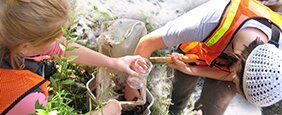Background for Teachers
Field sampling with a large crew of students is thrilling. If your students are prepared and all have jobs to do then your day should be smooth. It may help you to have a checklist of “Data to be Collected” so that you can ensure that students stay on task-especially if you are pressed for time.
Goals
- Safely carry out the protocols necessary to ensure a successful field day
Outcomes
- Students will have samples collected, information about their site, or sampling event conditions
Where does this lesson happen in the Project?
This is the third lesson in Unit 4: Field Sampling to Support Your Claim. This lesson follows Classroom Activity 2: Preparing for Sampling.
For this project field sampling must occur prior to November 1.
Getting Ready
Make sure that your students have their gear and protocols and know what information they will be collecting.
Materials
- Field protocols
Refer to materials lists made after your students reviewed all field protocols and created your class Health and Safety and Leave No Trace protocols.
Handouts (see also Lesson Resources)
- Field data sheet
- Field protocols
- Any data sheets your students created
- Fieldwork assessment
Student Prerequisites
- Students must have their field gear and protocols assembled and ready to go
Time Needed
Variable. If you must you can do the fieldwork in 80 minutes. More time is preferable.
Doing the Activity
In the field:
- Once you have arrived at your site have your students quickly look over the site and make note of the general layout and area, and, if this is not your first time to the site, note any changes
- If jobs/teams have not been assigned, assign them now
- After all data and samples have been collected make sure all trash is picked up and the site looks like it did when you arrived. Ensure that all equipment is accounted for
Returning from the field:
- All equipment is checked and put away
- Data are entered
- Data Sheets are stored in a project-specific location.
- Samples to be submitted for organism identification are stored in alcohol in bottles in a safe place (the chemical locker if your school has one) until samples can be submitted
Refer to Activity 4: Sample Submission for instructions on submitting you samples for organism identification.
Assessment
Formative
Check in with students throughout the event to ensure that protocols are being followed and that students are taking in everything they can about their field site.
Summary
Ask groups to fill out the Fieldwork section of their Fieldwork assessment Checklist and hand it in-compare it with your own evaluation.
Ask your students to submit a narrative about the field event. Reflect on group work, being outside, questions they may have about the questions they are investigating, initial thoughts about conducting fieldwork.
Lesson Extensions and Supplements
None at this time
Lesson Resources
- Field data sheet
- Field protocols
- Any data sheets your students created
- Fieldwork assessment
- Fieldwork assessment (Teacher Edition)
- Field Sampling “Data to be Collected” Checklist (made by you or your class)

 Acadia Learning brings scientists, teachers, and students together in partnerships that result in useful research and effective science education.
Acadia Learning brings scientists, teachers, and students together in partnerships that result in useful research and effective science education.